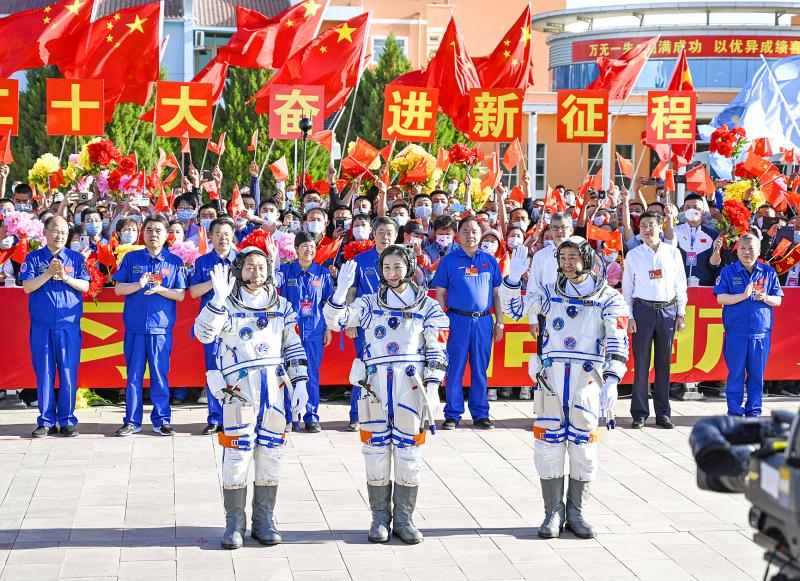China yesterday launched a rocket carrying three astronauts on a mission to complete construction on its new space station, the latest milestone in Beijing’s drive to become a major space power.
The trio blasted off in a Long March-2F rocket from the Jiuquan launch center in northwestern China’s Gobi desert, with the team to spend six months expanding the Tiangong space station, state broadcaster China Central Television said.
Tiangong, which means “heavenly palace,” is expected to become fully operational by the end of this year. China’s heavily promoted space program has already seen the nation land a rover on Mars and send probes to the moon.

Photo: AFP
The Shenzhou-14 crew is tasked with “completing in-orbit assembly and construction of the space station,” as well as “commissioning of equipment” and conducting scientific experiments, state-run China Global Television Network said on Saturday.
Led by air force pilot Chen Dong (陳冬), the three-person crew’s main challenge is to connect the station’s two lab modules to the main body.
Dong, along with fellow pilots Liu Yang (劉洋) and Cai Xuzhe (蔡旭哲), are to become the second crew to spend six months aboard the Tiangong after the last returned to Earth in April following 183 days on the space station.
Tiangong’s core module entered orbit earlier last year and is expected to operate for at least a decade.
The station shares a similar design with the Soviet Mir station that orbited Earth from the 1980s until 2001.
The world’s second-largest economy has poured billions into its military-run space program, with hopes of having a permanently crewed space station this year and eventually sending humans to the moon.
The country has made large strides in catching up with the US and Russia, whose astronauts and cosmonauts have decades of experience in space exploration.
Under Chinese President Xi Jinping (習近平), the country’s plans for its heavily promoted “space dream” have been put into overdrive.
In addition to a space station, Beijing is also planning to build a base on the moon, and the Chinese National Space Administration said it aims to launch a crewed lunar mission by 2029.
China has been excluded from the International Space Station (ISS) since 2011, when the US banned NASA from engaging with the country.
While China does not plan to use its space station for global cooperation on the scale of the ISS, Beijing has said it is open to foreign collaboration.
The ISS is due for retirement after 2024, although NASA has said it could remain functional until 2030.

‘EYE FOR AN EYE’: Two of the men were shot by a male relative of the victims, whose families turned down the opportunity to offer them amnesty, the Supreme Court said Four men were yesterday publicly executed in Afghanistan, the Supreme Court said, the highest number of executions to be carried out in one day since the Taliban’s return to power. The executions in three separate provinces brought to 10 the number of men publicly put to death since 2021, according to an Agence France-Presse tally. Public executions were common during the Taliban’s first rule from 1996 to 2001, with most of them carried out publicly in sports stadiums. Two men were shot around six or seven times by a male relative of the victims in front of spectators in Qala-i-Naw, the center

Incumbent Ecuadoran President Daniel Noboa on Sunday claimed a runaway victory in the nation’s presidential election, after voters endorsed the young leader’s “iron fist” approach to rampant cartel violence. With more than 90 percent of the votes counted, the National Election Council said Noboa had an unassailable 12-point lead over his leftist rival Luisa Gonzalez. Official results showed Noboa with 56 percent of the vote, against Gonzalez’s 44 percent — a far bigger winning margin than expected after a virtual tie in the first round. Speaking to jubilant supporters in his hometown of Olon, the 37-year-old president claimed a “historic victory.” “A huge hug

Two Belgian teenagers on Tuesday were charged with wildlife piracy after they were found with thousands of ants packed in test tubes in what Kenyan authorities said was part of a trend in trafficking smaller and lesser-known species. Lornoy David and Seppe Lodewijckx, two 19-year-olds who were arrested on April 5 with 5,000 ants at a guest house, appeared distraught during their appearance before a magistrate in Nairobi and were comforted in the courtroom by relatives. They told the magistrate that they were collecting the ants for fun and did not know that it was illegal. In a separate criminal case, Kenyan Dennis

The US will help bolster the Philippines’ arsenal and step up joint military exercises, Manila’s defense chief said, as tensions between Washington and China escalate. The longtime US ally is expecting a sustained US$500 million in annual defense funding from Washington through 2029 to boost its military capabilities and deter China’s “aggression” in the region, Philippine Secretary of Defense Gilberto Teodoro said in an interview in Manila on Thursday. “It is a no-brainer for anybody, because of the aggressive behavior of China,” Teodoro said on close military ties with the US under President Donald Trump. “The efforts for deterrence, for joint resilience